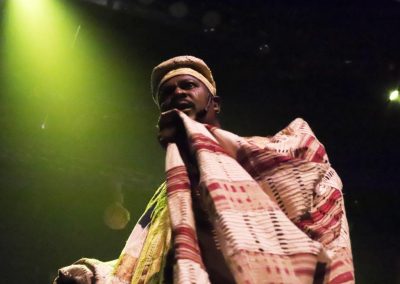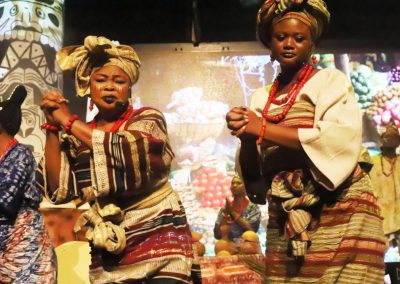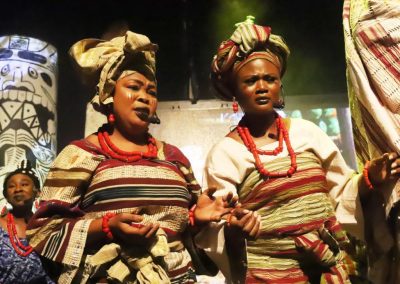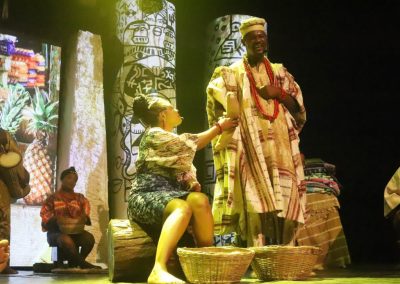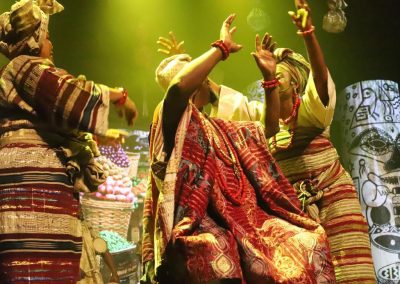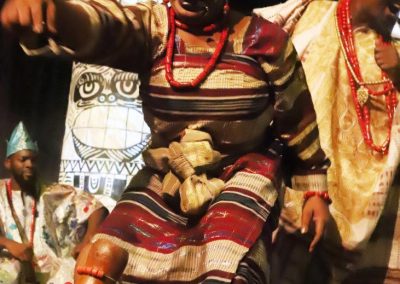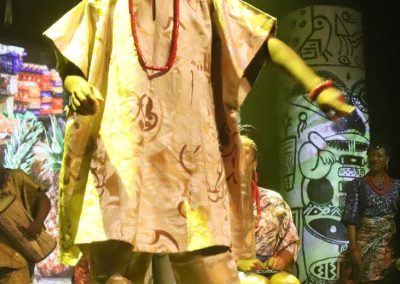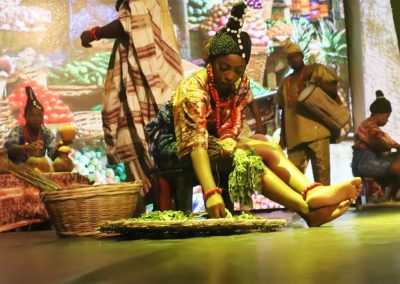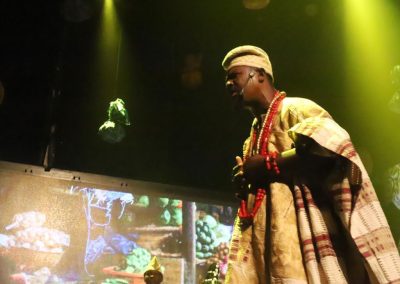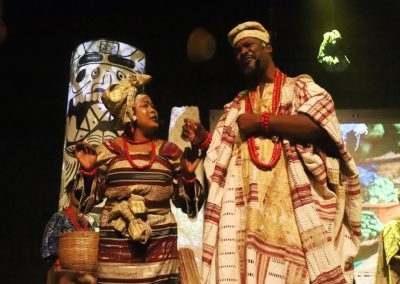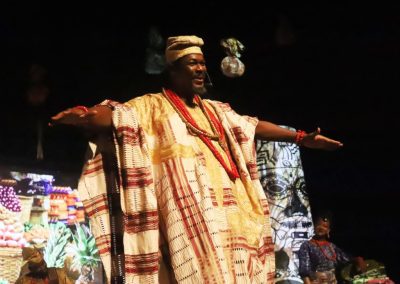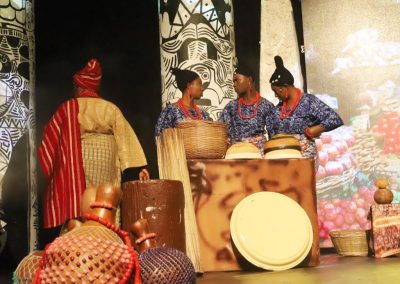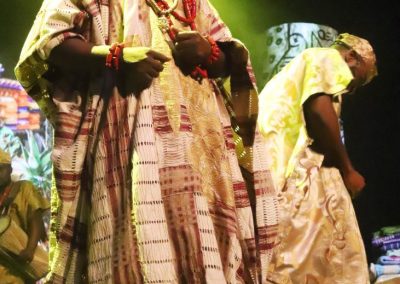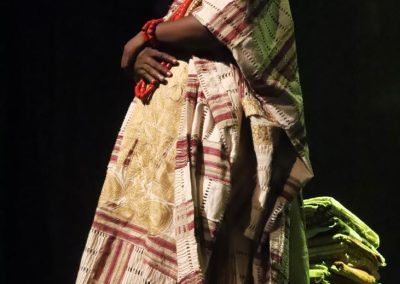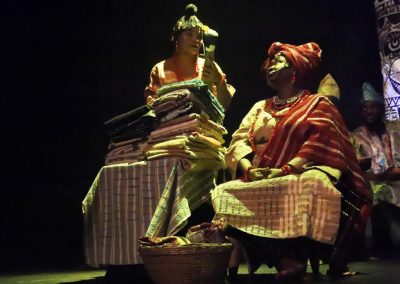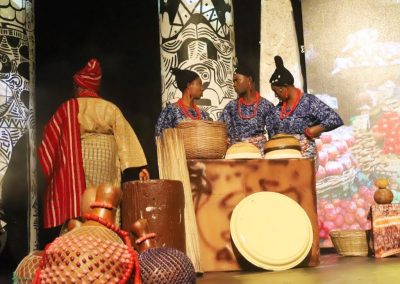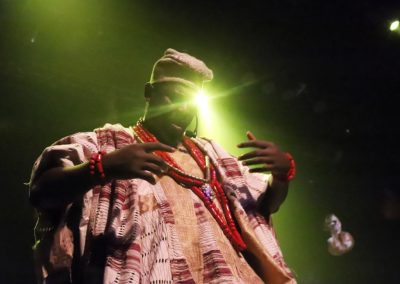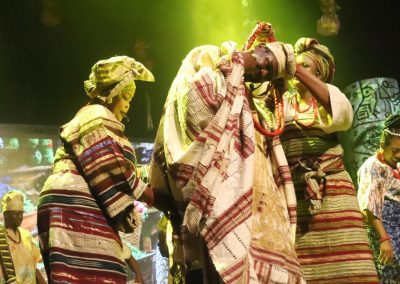Death & The King’s Horseman Highlights & Reviews
“Beyond the theme of leadership, it touches on procrastination or indecision. And above all, of course, the story showcases the best of our culture; how beautiful our costumes, our history, and our language are, how deep our culture and traditions are, all of which the white man has usurped.”
“You say that a man can commit suicide by saving his ship but then you say we cannot do that to save the honour of our race because that is what we believe in. You light a candle and speak gibberish, all kinds of incantation but you say that our own must be done in the open when he wants to say the secrets to his son. It shows you how strong our tradition and culture were until these guys came in and decimated it.”
To top it all BAP made three bold choices in cast, she cast the Brittish Resident as a woman, her Sargent is African, creating a new conflict within the play between him and the Elesin’s son, and Mr. Pilkings, the British officer, with Timi Charles Fadipe.
Prof. Soyinka himself had graced the play with his presence on one of the shows and his review was, in his words, “Seven Gbosas”.
Needless to say we hope for another run of this magnificent production.
Death And The King’s Horseman Interrogates Colonial Era Parallels
As the showing of ‘Death and the King’s Horseman’, one of Wole Soyinka’s classics wound down the holidays, it was time for some introspection.
Put on stage by Bolanle Austen-Peters and BAP-Productions , the Wole Soyinka classic was shown over 9 days, December 16th, 2021, to January 3rd, 2022, at culture hub Terra Kulture, two shows daily.
Based on true events, ‘Death and the King’s Horseman’ follows the times of Elesin Oba, the king’s horseman, whose destiny it is to commit ritual suicide because his spirit is essential to helping the King’s spirit ascend to the afterlife. According to some Yoruba traditions, the death of the king must be followed by the ritual suicide of the king’s horseman as well as the king’s dog and horse otherwise, the king’s spirit will wander the earth and bring harm to his people.
Among the many themes portrayed by the drama is that of fulfiling one’s destiny as portrayed by Elesin’s quote; “A man is either born to his art or he isn’t.”
Bolanle Austen-Peters, who directed the stageplay, opines that one of the thematic inferences to be drawn from the play rests strongly on leadership and the responsibilities that come with it.
“It is telling you that if you have responsibilities, you must live up to it because when you don’t, there are dire consequences for everybody.”
On the day of the ritual, the Elesin veers off course when he decides to take a new bride a few hours to the ultimate sacrifice. This is against the advice of the Iyaloja, the women’s spiritual leader and head of the market. Even the departed king from beyond makes a passionate appeal to Elesin; “If you cannot come to me, return my favourite horse, so I can ride on through the gate alone.”
However, things go awry when Amusa, a local police officer reports to the British District Officer, Mr. Pilikings that the Elesin is about to commit the ‘crime of death’ and was saddled with the responsibility of stopping the ‘criminal intent’.
While the Iyaloja prevails on the Elesin to stay on the course of his destiny, Mrs. Pilikings, the wife of the District Officer, prevails on her husband to be more circumspect in handling the situation. The events that follow lead to an otherwise avoidable catastrophe.
Giving her take on the drama, Ronya Man, who plays Mrs. Pilikings, belives that the drama portrays women as symbols of power. She states; “Funny enough, even in this 1946 story, Soyinka wrote Iyaloja and Mrs. Pilkings – wife of the British officer, as symbols of the power of women to make a change, if only men had listened to them.”
Written during the era of the Second World War, the drama questions the hypocrisy of the colonialists by juxtaposing the notion of foreign soldiers going on suicide missions while the culturally sanctioned ritual is considered primitive. This is even more pronounced by the Anglican colonialist who believes that suicide is a crime before God.
While Death and the King’s Horseman may have graced other stages, BAP Productions took things a notch higher by adding other elements that bring out the intensity of the play. From the original songs, composed specifically for the drama to Austen-Peters’ directorial interpretations, guests were left in awe of the myriad of talents on stage.
Olarotimi Fakunle, who plays Elesin Oba, confessed to have gone on a spiritual journey to get his head in the game and marinaded himself in the mindset of one who lives his entire life knowing he will be used as a sacrifice.
Bolanle Austen-Peters notes that more than ever, the drama is relevant to present-day Nigeria

